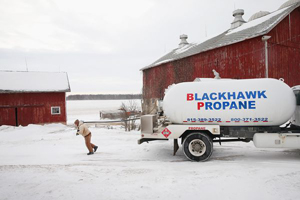US turkey producers protected by propane legislation

The US’s National Turkey Federation (NTF) along with state, regional and federal leaders have been working since last winter with top senators to provide solutions to ensure adequate cold-weather propane supplies.
In response, US Senator Al Franken (D-MN) has introduced the “Propane Supply for Heating Act of 2014,” cosponsored by Senate Energy Committee’s top leadership, including Sens. Rob Portman (R-OH) and Tammy Baldwin (D-WI).
“Last winter’s lessons must be applied to safeguard the lives and livelihood of rural residents dependent on propane for farmhouses and livestock barns before the arrival of bitter cold temperatures and uncertain heating supplies,” said Joel Brandenberger, NTF President.
“The Propane Supply for Heating Act of 2014” provides for:
- Information collection that will allow for additional transparency
- Department of Energy coordinated federal and state emergency response
- Study Federal Energy Regulatory Commission (FERC) role regarding propane markets
- Examine the feasibility of a Midwest Home Heating Propane Reserve
- Low interest loans through USDA for propane tank purchases
“Minnesota’s poultry farmers thank Senator Al Franken for his tireless efforts to correct a system that is currently broken and needs further oversight. The legislation he introduced today will go a long way toward improving the transparency and availability of propane supplies for both farmers and homeowners to prevent a repeat of last winter’s crisis,” said Steve Olson, executive director of the Minnesota Turkey Growers Association (MTGA).
In testimony before the Senate Energy Committee in May, John Zimmerman, an NTF board member and past president of the Minnesota Turkey Growers Association, discussed the slow pace of determining regulatory authority to assist during a critical and immediate threat.
“What was most troubling last winter was the lack of transparency. Sens. Portman and Franken focus on the issue is reassuring,” said Jim Chakeres, executive vice president of the Ohio Poultry Association. “This legislation is a positive step to ensure Midwestern farmers and families don’t have to go cold again and be forced to ration their propane supply.”
The bitter cold of last winter stressed already low inventories of propane used to dry a wet, late fall corn harvest. Regional pipeline maintenance then strangled distribution by half, forcing canceled delivery contracts and a supply scramble when prices surged from $1.30 per gallon to more than $8 per gallon, gouging deep into turkey growers’ very thin operating margins.
Lowering thermostats in barns and farmhouses to ration propane caused a loss of production efficiency and concern for the welfare of the animals. The statewide impact of protecting turkeys from the killing freeze in Minnesota totaled $25 million more than the previous winter, before the Federal Energy Regulatory Commission stepped in to order priority pipeline distribution of propane.













